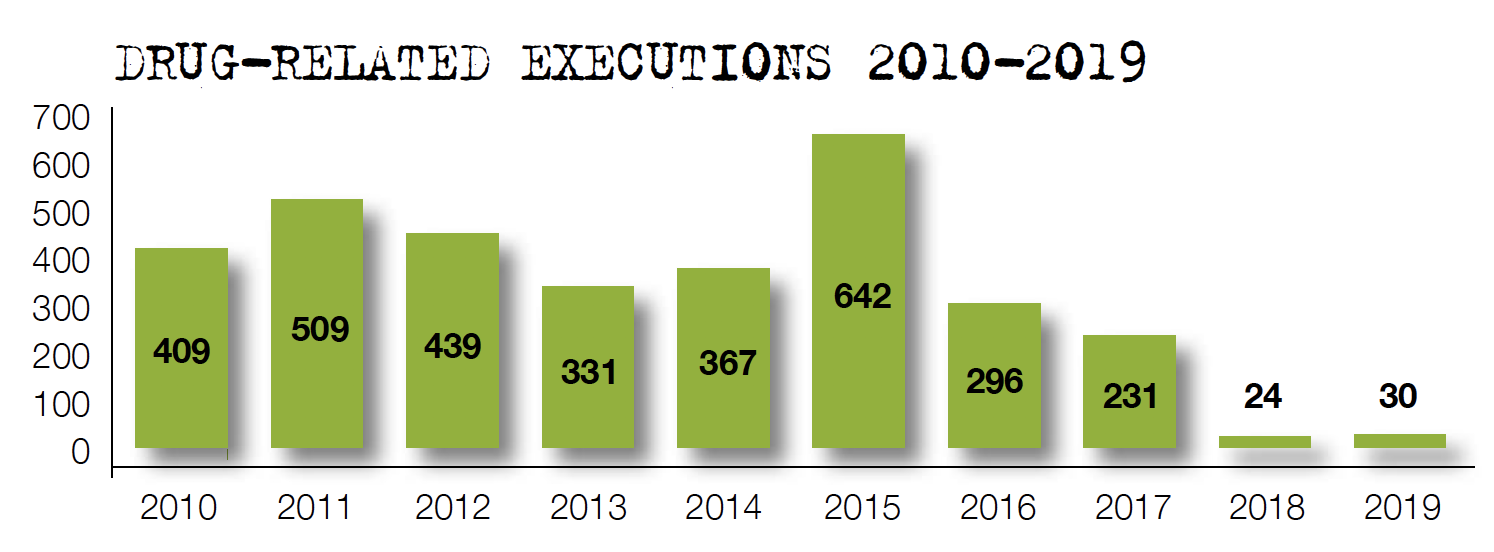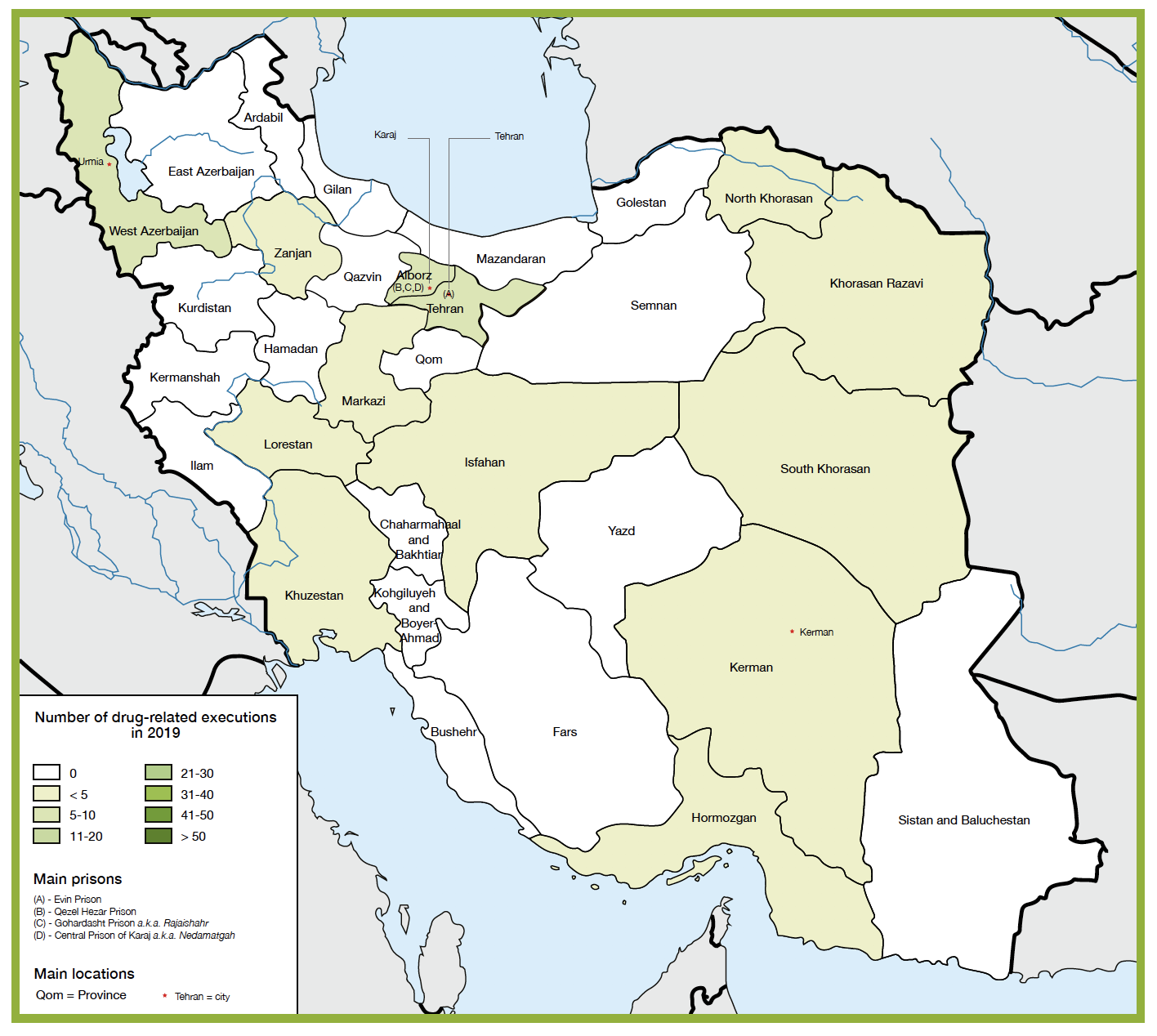Iran Human Rights (IHR) – The 12th annual report on the death penalty by Iran Human Rights (IHR) and ECPM (Together Against the Death Penalty) provides an assessment and analysis of the death penalty trends in 2019 in the Islamic Republic of Iran. It sets out the number of executions in 2019, the trend compared to previous years, the legislative framework and procedures, charges, geographic distribution and a monthly breakdown of executions. Lists of the female and juvenile offenders executed in 2019 are also included in the tables.
The report also looks into the abolitionist movement within Iran, including the forgiveness movement and its contribution to limiting the use of the death penalty, the artists and filmmakers attempting to promote abolition, and the authorities’ attempt to promote the death penalty and crackdown on human rights defenders.
In this article, you will read a section of the report regarding drug-related executions in Iran in 2019.
For references and more, see the Annual Report of the Death Penalty in Iran (pdf)
According to reports gathered by IHR, at least 30 people were executed for drug offences in 2019. This represents a 25% increase compared to 2018 and a 90% reduction compared to 2017. This shows that the amendments to the Anti-Narcotics law which were enforced in November 2017 have, for two years in a row, led to a significant decrease in the number of executions for drug offences.
Some facts about the drug-related executions in 2019:
• 30 people were executed – 6 more than 2018;
• Only 1 of the drug-related executions was announced by official sources;
• Executions took place in 12 different provinces.

According to IHR reports, at least 3,278 people were executed for drug offences between 2010 and 2019. This gives an average of 328 drug-related executions per year. The diagram above shows that the number of drug-related executions in the last two years has been significantly lower than the “average” since 2010.
MONTHLY EXECUTIONS FOR DRUG-RELATED CHARGES

GEOGRAPHIC DISTRIBUTION OF DRUG-RELATED EXECUTIONS IN 2019
In 2019, IHR reported drug-related executions in 12 provinces, compared to 7 in 2018 and 22 provinces where such executions took place in 2017. This might indicate that the review process following enforcement of the new amendments to the Anti-Narcotics Law has come to an end in many of the provinces.

EXECUTED ON THE BASIS OF DRUG CHARGES IN 2019
Two men, one of them with an academic background, were hanged for drug-related charges at the prison of the Iranian city of Kerman on October 6, 2019. According to IHR sources, the prisoners were identified as Abdolhakim Shahbakhsh and Assadollah Alizehi both belonging to the Baluchi ethnic group.
“Asadollah Alizehi was a former political prisoner and activist when he was studying science at university. He had been arrested for his political activities before. However, due to financial pressures his path of life was changed”, Baluch activist Habibollah Sarbazi told IHR, “this is the case for many people, even professionals and university graduates at the Iranian province of Sistan and Baluchistan”.

According to the Baluchi Activists Campaign, the two were sentenced to death for smuggling drugs and involvement in clashes with police.
TWO YEARS AFTER ENFORCEMENT OF THE NEW AMENDMENTS TO THE ANTI-NARCOTICS LAW: THE PROCESS, IMPACT, SHORTCOMINGS AND THE FUTURE
More than two years ago, on November 14, 2017, a new amendment to the Iranian Anti-Narcotics Law came into force. This led to a significant drop in the number of drug-related executions in 2018 and 2019. However, as mentioned in the annual report of 2018, IHR expressed its worries about “disproportionation between crime and punishment: most prisoners whose death sentences were commuted have been sentenced to 30 years in prison and 200 million Tomans fine, regardless of the type and degree of the crime”.
It seems Iranian MPs decided to address the issue in Parliament on December 22, 2019. On that day, members of Parliament voted to reduce the jail term for drug offenders by half for those who are arrested for the first time for drug offenses.83 By coming into force, the bill can solve the aforementioned disproportion between crime and punishment.
As mentioned in previous reports, the issue of due process has not been mentioned in the new amendments. All drug offences are processed by the Revolutionary Courts. Reports collected by IHR show that those arrested for drug offences are systematically subjected to torture during the weeks after their arrest. Often they have no access to a lawyer while in detention and by the time the lawyer enters the case they have already “confessed” to the crime. Trials at the Revolutionary Courts are often very short and there is little the lawyer can do. The issue of due process and fair trials has not been addressed by the new amendments to the Anti-Narcotics Law.
For more details, please see the report by IHR “Execution trends six months after the Anti- Narcotics Law” published in May 2018 and the annual report on the death penalty in Iran 2018.
 Shabtabnews In this dark night, I have lost my way – Arise from a corner, oh you the star of guidance.
Shabtabnews In this dark night, I have lost my way – Arise from a corner, oh you the star of guidance.


